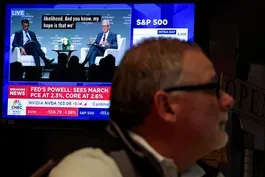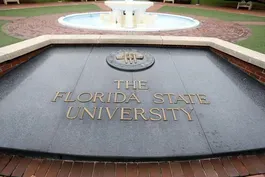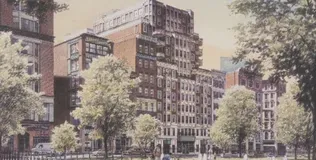
Israel deepens assault on Gaza while blocking aid
Clip: 4/17/2025 | 8m 36sVideo has Closed Captions
Israel deepens assault on Gaza, ordering deadly strikes and blocking aid
The lead Hamas negotiator for ceasefire talks offered to swap all hostages held in Gaza for an agreed-upon number of Palestinians jailed in Israel. The offer came after Hamas reportedly rejected the latest Israeli proposal. Meantime, airstrikes overnight killed at least 27 Palestinians as the lack of aid into Gaza threatens hundreds of thousands. Nick Schifrin reports.
Problems with Closed Captions? Closed Captioning Feedback
Problems with Closed Captions? Closed Captioning Feedback
Major corporate funding for the PBS News Hour is provided by BDO, BNSF, Consumer Cellular, American Cruise Lines, and Raymond James. Funding for the PBS NewsHour Weekend is provided by...

Israel deepens assault on Gaza while blocking aid
Clip: 4/17/2025 | 8m 36sVideo has Closed Captions
The lead Hamas negotiator for ceasefire talks offered to swap all hostages held in Gaza for an agreed-upon number of Palestinians jailed in Israel. The offer came after Hamas reportedly rejected the latest Israeli proposal. Meantime, airstrikes overnight killed at least 27 Palestinians as the lack of aid into Gaza threatens hundreds of thousands. Nick Schifrin reports.
Problems with Closed Captions? Closed Captioning Feedback
How to Watch PBS News Hour
PBS News Hour is available to stream on pbs.org and the free PBS App, available on iPhone, Apple TV, Android TV, Android smartphones, Amazon Fire TV, Amazon Fire Tablet, Roku, Samsung Smart TV, and Vizio.
Providing Support for PBS.org
Learn Moreabout PBS online sponsorshipAMNA NAWAZ: The lead Hamas negotiator for cease-fire talks late today offered a deal to swap all hostages held in Gaza for an agreed-upon number of Palestinians jailed in Israel as part of a larger agreement to end the war.
The offer came after Hamas reportedly rejected the latest Israeli proposal for an exchange and cease-fire.
In the meantime, Israeli airstrikes overnight killed at least 27 Palestinians, including 15 children, as the lack of aid into the enclave threatens hundreds of thousands.
Nick Schifrin reports.
And a warning: Images in this story are disturbing.
NICK SCHIFRIN: In Gaza, war spares no one.
Too young to comprehend yet forced to suffer its cruelty, the Abu Amsha brothers were injured in last week's strike on Gaza City's Shujaiya neighborhood.
Israel said the target was a senior Hamas commander.
Palestinian officials say 30 people died, including eight children, many from the Abu Amsha family.
WOMAN (through interpreter): I got a call that my daughter-in-law's home was hit.
Why?
Everyone in that building was women and children, all women and children.
I came out here to find them all martyred.
And that's not including those that are still under the rubble.
NICK SCHIFRIN: Amidst that rubble, rescue workers dig for survivors, some pinned down by thousands of pounds of collapsed concrete, but mostly the victims were buried in their homes.
In Central Gaza on Sunday, Ibrahim Abu Muhadi lost six sons.
The family says an Israeli airstrike hit their car.
Israel says it targeted a Hamas commander.
IBRAHIM ABU MUHADI, Father of Children Killed in Strike (through interpreter): They were civilians.
A 10-year-old boy went out to help his brothers, so that they could get food to eat in the shadow of this siege.
For what sin were they killed?
NICK SCHIFRIN: And once again, even the homes for healing have become targets, including this makeshift field hospital struck Tuesday in the so-called safer humanitarian zone of Al-Mawasi.
And last weekend, the target was Gaza City's last fully functional hospital bombed in an Israeli airstrike, survivors rushed out by loved ones.
And rescue workers searched the devastation by flashlight.
Israel said Hamas used the hospital as a command-and-control center.
By dawn, the destruction on full display.
Somewhere in here among the patients were three daughters of Khalil Masoud Mostafa Bakr.
KHALIL MASOUD MOSTAFA BAKR, Survivor, Baptist Hospital Strikes (through interpreter): We got a warning to evacuate the hospital.
We started running to the front of this area, and they started hitting the hospital.
Imminent death makes you lose your mind.
My daughter, who lost her leg, spends all day yelling.
My other daughter had surgery today for her arm.
What's the future?
Where should I take them?
NICK SCHIFRIN: There are few options.
And since the war restarted, over 500,000 have been again displaced.
Israel says its strategy has been not only military maneuvers, but seizing and holding territory.
Israel never left the Philadelphi Corridor along the Egypt border, or a buffer zone around the Strip.
Since the war restarted, it expanded that buffer zone from hundreds of feet to nearly a mile, recaptured the Netzarim Corridor that bisects Gaza with an 18-mile security zone around it.
Israel's also created what it calls the Morag Corridor, named after an ancient Jewish settlement, and connected it to a security zone that includes all of Rafah.
Israel's believed to control nearly one-third of Gaza.
BENJAMIN NETANYAHU, Israeli Prime Minister (through interpreter): Last night in the Gaza Strip, we switched gears.
The IDF is seizing territory, striking the terrorists and destroying the infrastructure, because we are now dividing the Strip and increasing the pressure step by step so that they will give us our hostages.
NICK SCHIFRIN: Hamas is still holding 59 hostages, two dozen or so believed to be alive.
Israel and the U.S. rewrote a January cease-fire deal and want Hamas to release all of the hostages now.
DONALD TRUMP, President of the United States: Yes, we're trying to get the hostages out, we got quite a few of them out, but it's a long process.
It shouldn't be that long.
NICK SCHIFRIN: Alongside Prime Minister Benjamin Netanyahu last week, President Trump reiterated his desire for U.S. control of Gaza.
DONALD TRUMP: Having a peace force like the United States there controlling and owning the Gaza Strip would be a good thing.
And if you take the people, the Palestinians, and move them around to different countries, and you have plenty of countries that will do that, and you really have a freedom zone, a zone where people aren't going to be killed every day.
NICK SCHIFRIN: Israel's strategy has also included stopping all aid from entering Gaza for more than six weeks.
It's left many Gazans hungry and desperate and spiked prices of food in the market so it's unaffordable to most families, who are increasingly restricted to cooking with canned beans and vegetables.
The U.N. warns, children and infants are at great risk and face growing malnutrition.
And because of a lack of clean water, they also face disease.
Wafaa Ghaban is a displaced mother of five sheltering in a Gaza City tent camp whose toddler fell ill. WAFAA GHABAN, Displaced Gazan (through interpreter): My son is sick from the environment and the pollution we have been living in.
He had diarrhea and a fever all night.
We want a better life than this.
Our kids want to live.
Their childhoods have been taken from them.
NICK SCHIFRIN: Twenty-eight-year-old Amani Ma'Rouf is a pregnant mother of three.
She comes here, a trash-riddled camp, to try and find water and food.
She and her children don't even have a tent to sleep in.
AMANI MA'ROUF, Displaced Gazan (through interpreter): There are flies and mice and creatures, and the kids can't fall asleep.
I'm in my eighth month of pregnancy, and I have three children, and we're not able to properly eat or drink.
The simplest thing we need is food, and I can't guarantee that for my children.
We're not even living in a tent, but besides a tent on the street near garbage.
NICK SCHIFRIN: U.N. Secretary-General Antonio Guterres called conditions in Gaza unsustainable.
ANTONIO GUTERRES, United Nations Secretary-General: As aid has dried up, the floodgates of horror have reopened.
Gaza is a killing field, and civilians are in an endless death slope.
NICK SCHIFRIN: But Israel says Hamas has been stealing the aid, and an Israeli official tells PBS News' cutting aid off restricts Hamas' ability to raise funds and pay its fighters.
As Defense Minister Israel Katz wrote yesterday: "Stopping humanitarian aid undermines Hamas' control over the population, and we will create a new infrastructure for distribution of aid through civilian companies in the future."
Creating an alternative to Hamas is also the goal of new unprecedented anti-Hamas protests.
They began last month and restarted this week.
A man we will call Said is an anti-Hamas protester who asks we conceal his identity.
"SAID," Anti-Hamas Protester (through interpreter): A lot of people who believed in Hamas finally realized that it's not a resistance group that aims to protect or bring any rights to the Palestinian people and that all it cares about is itself, its own fate, and the future of the group, regardless of how many civilian lives are being lost for no reason in this war.
NICK SCHIFRIN: Members of Hamas have killed their critics.
Why are you, why are so many others right now willing to take that risk and criticize Hamas publicly?
"SAID" (through interpreter): Because this stems from a moral and humanitarian duty for our people.
We have the responsibility to speak up.
It is illogical and not acceptable to remain silent out of fear of Hamas' terrorism.
If we all remain silent today, we are helping the propaganda promoted by the Israeli right-wing that says that all Gazans are Hamas.
Therefore, we speak.
We shout.
We ask all Gazans to get out and say we are not Hamas.
Hamas is a terrorist organization.
NICK SCHIFRIN: But there's no sign Hamas is listening to its Palestinian critics.
And Israel vows to continue fighting, so the deprivation, the damage, and the suffering will go on.
For the "PBS News Hour," I'm Nick Schifrin.
Chicago Fed president on Trump's trade war
Video has Closed Captions
Chicago Fed president on Trump's trade war and threats to fire Powell (7m 40s)
Explaining meme coins and why they often crash
Video has Closed Captions
Explaining meme coins and why the joke-inspired cryptocurrencies often crash (7m 31s)
Investigators say FSU shooter is son of deputy
Video has Closed Captions
Investigators say FSU shooter is son of deputy who used mother's former service weapon (2m 29s)
L.A. schools leader on blocking DHS agents from students
Video has Closed Captions
Los Angeles schools leader explains why he refused to let DHS agents see students (8m 40s)
Museum showcases artist's work bringing buildings to life
Video has Closed Captions
Exhibition showcases Frank Costantino's hand-drawn designs that bring buildings to life (4m 23s)
News Wrap: Ukraine and European countries push U.S. to take tougher stance on Russia
Video has Closed Captions
News Wrap: Ukraine pushes U.S. for tougher stance on Russia (3m 43s)
Van Hollen blocked from seeing deported man in El Salvador
Video has Closed Captions
Sen. Van Hollen says El Salvador soldiers blocked him from seeing wrongly deported man (8m 9s)
Providing Support for PBS.org
Learn Moreabout PBS online sponsorshipSupport for PBS provided by:
Major corporate funding for the PBS News Hour is provided by BDO, BNSF, Consumer Cellular, American Cruise Lines, and Raymond James. Funding for the PBS NewsHour Weekend is provided by...


















